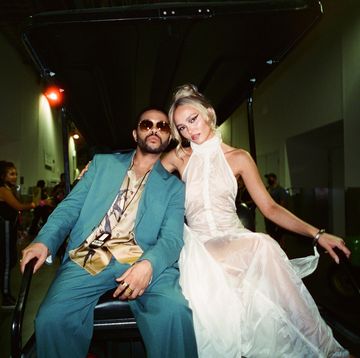It’s debatable whether the makers of They Call Me Magic, Apple TV+’s new four-part documentary about the LA Lakers’ talismanic point guard Earvin “Magic” Johnson, were pleased – or very much displeased – to discover that another show, HBO’s glitzy drama Winning Time, about the rise of the Lakers during Magic’s reign in the late Seventies and early Eighties, was also in the works. Would the fact that HBO’s show landed first – and is in fact already seven episodes down, with the eighth airing on Monday – mean that by the time their doc series came out, which it does today, there’d be nothing left to say? Or would Winning Time create buzz that a secondary show could capitalise on?
Perhaps that should be “second”, not “secondary”, but in some ways They Call Me Magic, directed by Rick Famuyiwa (Dope), does feel like a kind of York Notes for the HBO series, which bears the high-energy, big-characters, whizzy-casting hallmarks of its executive producer Adam McKay. Winning Time is a show with big ambitions, and doesn't just portray Magic Johnson and the other major players of his generation, such as his mentor (and occasionally tormentor) Kareem Abdul-Jabaar and his nemesis Larry Bird, but the backstage team of down-at-heel middle-aged men (owner Jerry Buss, coaches Jerry West, Jack McKinney, Paul Westhead and Pat Riley) who also helped bring the Lakers to greatness. So what can They Call Me Magic do that Winning Time doesn't?
For starters, it can fill in some blanks. Where Winning Time begins with Johnson getting drafted by the Lakers in 1979, the first episode of They Call Me Magic delves further back into Johnson’s high school career in Lansing, Michigan, where he was already causing a sensation on the court and, thanks to some savvy branding by a local sports reporter, the legend of “Magic” was well underway. It can also luxuriate in archive footage that doesn’t tell so much as show how Johnson’s nickname was earned: the no-look passes, the telepathic alley-oops, the way he could make his team, when at their best, work like one single-brained organism. Also, his love life: while Winning Time is big on raunch – Johnson has admitted to a sexually profligate lifestyle in his playing days – They Call Me Magic goes for romance, expounding on the emotional connection Johnson felt with Earlitha “Cookie” Kelly, whom he met at college and would become – and despite some difficult periods (see "sexually profligate lifestyle," above) remain – his wife.
What They Call Me Magic, as a documentary series, also demonstrates is just how well Winning Time, as a drama, is cast: 26-year-old actor Quincy Isaiah might not be a dead ringer for Johnson, but he captures his charisma – the ever-present smile, the open, determined eyes – to a tee. Solomon Hughes as the cerebral Abdul-Jabbar, Adrien Brody as assistant coach Pat Riley and even John C Reilly as Buss are also inspired hires. Saying all that, They Call Me Magic is not without star power of its own, with a roster of talking heads that includes Johnson himself, Bird, Abdul-Jabaar, and also a raft of famous fans including Snoop Dogg, Samuel L Jackson, Spike Lee and not one but two former US Presidents (Obama and Clinton, natch).
There are some points – like, say, Johnson and Bird playing for Team USA at the World Invitation Tournament in 1978 – where the two shows seem to resonate, rather than compete. At the end of the first episode of They Call Me Magic it is 1980, and Abdul-Jabbar has sprained his ankle in game five of the NBA World Championship Series, leaving the stage set for Magic in game six. Which is roughly also where Winning Time has got to now, after seven episodes, with three more to go. Soon, though, they will diverge: They Call Me Magic’s further three episodes look deeper into the future, covering his wildly escalating popularity following the 1980 championships, then his HIV diagnosis in 1991 – which rocked the sporting world – and his more recent years as a family man and, somewhat less scintillatingly, as “a business powerhouse”.
So. If we’re down to seconds on the clock, which should you go for? Both Abdul-Jabbar and Johnson seem to know which they prefer: Abdul-Jabbar recently referred to the characters in Winning Time as “crude stick-figure representations”, while Johnson told Variety, “You can’t do a Lakers show without the Lakers”; something which the documentary series can definitely claim. (Jerry West, who’s portrayed as a hot-head in Winning Time, by Australian actor Jason Clarke, went further and has, according to ESPN, demanded a “retraction and an apology” from McKay.) If we had to choose, Winning Time, with its energy, glossy production values and sexy late-Seventies lasciviousness, takes it at the buzzer. But for a quieter, kinder take, They Call Me Magic is a worthwhile runner-up.
'They Call Me Magic' is released on Apple TV+ today. 'Winning Time' is available on NOW TV with new episodes released every Monday

Miranda Collinge is the Deputy Editor of Esquire, overseeing editorial commissioning for the brand. With a background in arts and entertainment journalism, she also writes widely herself, on topics ranging from Instagram fish to psychedelic supper clubs, and has written numerous cover profiles for the magazine including Cillian Murphy, Rami Malek and Tom Hardy.














